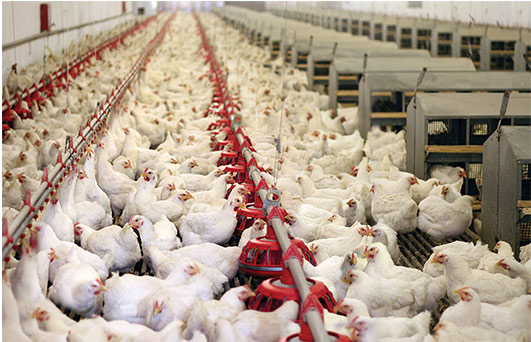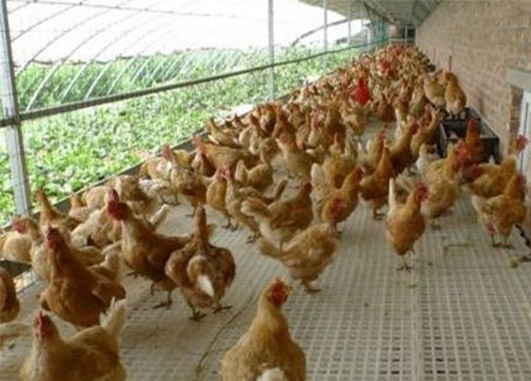Chicken cage chicken raising summer diarrhea prevention method
For the chicken farmers, the two phases of summer and winter are the most headaches for the farmers, because the temperature in these two stages is more extreme than the growth of the flock. With the continuous operation throughout the year, the farmers are about to usher in the hot summer season. In the summer season, the chickens are prone to diarrhea, so that the farmers can calmly face the phenomenon of chicken diarrhea in the summer season. . Through the experience of poultry equipment manufacturers, farmers are told about the causes of chicken diarrhea and how to prevent it.
1. Flock stress: The stress response of the flock will cause the flock to be diarrhea, and the flock will develop a stress reaction when it is transferred to the group or it will cause the flock to diarrhea. Therefore, farmers should try to avoid the stress response of the flocks in the process of raising the farmers. The action should be light when catching the chickens, so as to prevent strangers from entering and leaving the house.

2. Increased salt content in the feed: an increase in the salt content of the feed will increase the amount of water in the flock and cause the flock to be thin. Therefore, farmers should pay attention to the salt content of the feed when formulating feed for the chickens, especially when feeding the fish to the chickens.
3. Chickens can cause diarrhea when they are infected with E. coli or coccidiosis. Therefore, farmers should pay attention to the clean environment of the chickens and regularly disinfect the chicken houses to avoid infection of chicken diseases. Farmers who produce diarrhea can go to professional medical sites to purchase drugs.
4. Ensure that the drinking water of the chickens is clean. If the drinking water of the chickens is not clean, the water contains impurities or other germs, and the chickens will suffer discomfort after drinking, so it is necessary to ensure that the water consumed by the chickens is clean and pollution-free.
5. The high temperature in summer and the increased water consumption of the chickens will also cause the chickens to diarrhea. If this is the reason for the farmers, although they can be assured, take timely measures to reduce the temperature inside the house.
Analysis on the feeding management of broilers
The number and size of broiler chickens raised in broiler battery cages is growing at an alarming rate. The density of cultivation per unit area is large, and the management level of the breeders is higher than that of the net culture. In fact, no matter what farming mode and breeding conditions, we manage. The primary task is to manage the chickens so that the chickens have a comfortable living environment so that the chickens do not get sick or get sick.
1. Strict control of temperature, ventilation and humidity
Appropriate temperature, light and good ventilation are especially important for the growth of caged broilers. Therefore, in the actual feeding process, it must be strictly controlled. About temperature control. The demand for temperature varies during the different stages of broiler growth. Generally speaking, before brooding, it is necessary to keep warm in advance, and raise the temperature in the house to 26 °C; in the brooding period, the method of high temperature brooding is adopted, and the temperature usually needs to be controlled at about 33 °C, and then it is lowered by 0.5 per week.
Control about ventilation. During the brooding period, because the temperature in the house is relatively stable, we usually realize the ventilation and ventilation in the house by controlling the opening and closing of the fan. About the control of humidity. The humidity control in the brooding period is preferably 60-65%. Increasing the humidity in the house can be achieved by placing several water-filled basins in the house and increasing the humidity in the house by evaporation. Increase the humidity inside the house. It is not recommended to sprinkle water on the ground or install nozzles to increase the humidity in the house. The humidity in the breeding house should be kept at 40-60%, and the suitable humidity is conducive to the normal growth of broilers.

Humidity should not be too high or too low. If the humidity is too low, it will cause dehydration of broilers, poor growth of feathers, dry skin, and dust in the air, which may easily induce respiratory diseases. If the humidity is too high in summer, it will cause the evaporation and heat dissipation of the chicken body to be blocked, the feed intake will decrease, the drinking water will increase, and cause heatstroke. If the humidity is too high in winter, the chicken body will lose heat too much, the feed intake will increase, and the feed consumption will increase. This leads to an increase in the ratio of meat to meat and increases the cost of farming.
2. Do a good job of cleaning and disinfecting caged houses
The cleaning and disinfection of the chicken house and the chicken battery cages should be thorough, without leaving a dead angle. In particular, it is recommended that the caged broiler has a high breeding density. It is recommended to use spray or fumigation to disinfect. When disinfecting, pay attention to the use of disinfectant. Strictly control the dosage of the disinfectant. In addition, after the disinfection is completed, it is necessary to open the doors and windows in time, and do a good job of ventilation.
3. Equipment use
Large and medium-sized chicken farms have advanced equipment, but with advanced equipment, it is not always possible to raise chickens. With the scale and automation, the failure of farming is not uncommon. The key lies in the organic of people and equipment. In combination, the operator must not only be familiar with the principle of the equipment, but also observe it carefully. Because the temperature of the thermostat and the temperature of the house have a certain error, the error value should be adjusted to the minimum, so that the temperature of the house can be adjusted. The temperature at which the chicken is most suitable for growth. In addition, the operator must be proficient in the use of the equipment and the feeding procedures of the chicken at various stages, and can promptly discover and repair the failure of the equipment. Once the equipment is used improperly or the equipment fails, it will Caused huge economic losses.
The reason why the hen's egg production rate is not high
Eggs are rich in protein and are an indispensable food in people's lives. Moreover, many people choose to raise chickens, and the egg production rate of hens directly affects economic returns. So what is the reason for the low egg production rate of hens? So how to improve the laying rate of hens in chicken battery cages ?
1. Poor variety. The purchased chicken breeds are poor and miscellaneous, have poor disease resistance, low survival rate and low production performance.
2. The feed mix is not scientific. For example, if the feeding amount is insufficient, the feed is single, the collocation is unreasonable, and the feeding method is improper, etc., the laying rate of the hen is low.
3. There are problems in management. If there is insufficient water supply and poor water quality, management problems at various stages are not in place. The chicken house does not provide a suitable environment for growth and development, which will greatly reduce the growth and development potential of the chicken, resulting in low egg production performance and low egg production rate.
4. The density is high, and the poor sanitary conditions of the chicken house result in low egg production rate of the hen.
5. Improper management of the laying period. The hen should pay special attention to these points during the laying period:

(1) Change in temperature. Free-range chickens are greatly affected by the environment and cannot control temperature changes. When the temperature is less than 0 ° C and higher than 30 ° C, the chicken lays off production. In addition, when the temperature difference within 1 day exceeds 8 °C, it will affect the egg production of the flock.
(2) The lighting is unreasonable. Unreasonable illumination can lead to dysfunction of the physiology of laying hens, which affects the normal performance of laying performance.
(3) Environmental mutations. Wind and rain, external noise, vaccination, improper refueling, and animals entering the house can cause a drop in egg production rate, accompanied by a decline in egg quality.
(4) The elimination is not timely. The ills that are not in compliance with the standards, the weak, the disabled, and the low-yield or discontinued hens are not allowed to be eliminated, which affects the egg production of the chickens.
6. Unreasonable drugs and vaccines result in low egg production rate in hens.
7. Poor hygiene and disinfection awareness. The farm environment is dirty, chaotic, poor, and the disinfection awareness is poor, which poses hidden dangers for the spread of the disease, resulting in low egg production rate of the hen.
Chickens need to pay attention to four points in summer
1. Effective ventilation
Many farmers often use improper methods to ventilate the house. For example, installing an electric fan in the house directly blows the chicken. In fact, this method does not have much cooling effect. Because the chicken itself does not have sweat glands, it is only a hair dryer, no sweat evaporation does not take heat, and most of them are installed ceiling fans, the wind blows from top to bottom, which further prevents the rise of hot air and hinders the entry of low temperature air. Circulating hot air in the house is more likely to raise the ambient temperature. Although some farmers know to blow air from the outside to the inside, or ventilate the air outside the house, they do not know which fan should be blown inward, and which fan should be blown outwards, and the result is not good. In fact, this is not difficult to grasp, because the hot air in the house flows upwards, and the cold air flows below. As long as the fan that blows the hair in the house is installed below, the upper side can be exhausted outwards, so that it can form effective convection and take away part of the heat of the chicken body, which will have a good cooling effect.
2. Water spray cooling
Many farmers know that water spray can cool down, but I don't know how to use it. Sometimes the method is wrong, and it also plays the opposite role. First of all, we should understand the principle of water spray cooling. Water spray cooling is the use of liquid water to evaporate in the air, using evaporation and heat absorption to cool down, so it is necessary to consider this aspect when spraying water. First of all, the use of water evaporation, it is necessary to make water fog, which not only increases the surface area of the water, but also does not cause large drops of water to fall on the chicken, causing stress, or the formation of "falling chicken." The time of spraying water should be effective only when it is dry and windy. This is also conducive to the evaporation of water, and can not be carried out in the "sauna day" of high temperature and high humidity. That is just to increase the humidity, the water in the air is saturated, there is no evaporation, and the cooling effect is not achieved, and there is an opposite effect. At this time, it is sufficient to strengthen the effective ventilation.

3. Drinking water at the right time
Every time the high temperature comes, there are cases where the farmer has died of chicken due to lack of water. In addition to the common problems of water shortage, water leakage, water blocking, etc., another important reason is that due to the hot weather, individual chickens occupy the drinking water position. For example, when drinking water in a hanging pot, one or two chickens climbed onto the hanging pot, and other chickens could not drink water, causing water shortage and death. Therefore, the hotter the weather, the more often farmers should go to the house to observe and find problems in a timely manner.
4. Reasonable exercise
In the hot summer months, especially before the onset of heavy rain or during the high temperature and high humidity period in summer, the air pressure is particularly low. Individual chickens that are left untouched for a long time are likely to cause hypoxia death, which usually occurs in the afternoon or evening. Therefore, it is necessary to observe the chicken house frequently to make the chicken move in the chicken battery cages, which can reduce death and reduce losses.
